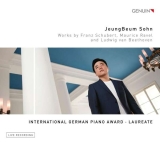 Franz Schubert: Klaviersonate a-Moll, D 784; Maurice Ravel: Gaspard de la nuit; Ludwig van Beethoven: Klaviersonate Nr. 32; JeungBeum Sohn, Klavier; 1 CD Genuin GEN20688; Liveaufnahme 11/2019, Veröffentlichung 04/2020 (68'02) - Rezension von Remy Franck
Franz Schubert: Klaviersonate a-Moll, D 784; Maurice Ravel: Gaspard de la nuit; Ludwig van Beethoven: Klaviersonate Nr. 32; JeungBeum Sohn, Klavier; 1 CD Genuin GEN20688; Liveaufnahme 11/2019, Veröffentlichung 04/2020 (68'02) - Rezension von Remy Franck
Es ist kein einfaches Programm, das sich JeungBeum Sohn, Gewinner des Deutschen Pianistenpreises 2019, für seine Debüt-CD ausgesucht hat, aber eines, in dem er sein Talent als einfühlsamer und eloquenter Gestalter voll ausnutzen kann. Er startet mit einer tiefschürfenden Interpretation von Schuberts a-Moll-Sonate, jenem schmerzlichen und selbst für Schubert extremen Zeugnis seines Seelenzustands im Februar 1823. Ende 1822 hatte er sich mit Syphilis infiziert. Er war im Januar noch immer sehr krank und im Februar weder genesen noch zuversichtlich, die Krankheit je wieder los zu werden. Dieser Gemütszustand schlug sich voll in der tragischen a-Moll-Sonate nieder.
Sohn versteht es, mit klarem Anschlag feine Nuancen herauszuarbeiten und sie mit den dramatischen Momenten zu kontrastieren, so die innere Dramatik und Spannung konsequent aufrechterhaltend, ohne das Emotionale wegen seiner selbst auftrumpfen zu lassen. Das Andante wird fein gestaltet, und das Allegro vivace wird mit gut artikuliertem Spiel und einer großen Vielfalt an Schattierungen zu einem sehr aufgewühlten Satz, der Wut mit hilflosem In-sich-Zusammensinken gut verbindet.
Sich danach an Maurice Ravel zu wagen, einer raffinierten Persönlichkeit, die nicht leicht aufzuspüren ist, war ein Wagnis, das JeungBeum Sohn mit einer unglaublich reichen Klangpalette minimisiert. Sohn spielt Ondine sehr flüssig und lebhaft. Le Gibet gelingt ihm weniger gut. Die schaurig-mysteriöse, tödliche Atmosphäre kommt nicht wirklich zum Ausdruck. Aber Scarbo läuft zu höchster Virtuosität auf, wobei das Unregelmäßige des torkelnd und wie besessen umher fliegenden Kobolds genau den Charakter der albtraumhaften Szene trifft, die Ravel in diesem Stück beschreibt.
Beethovens 32. Sonate spielt Sohn frisch und zugleich persönlich, spontan und sehr rhetorisch, mit einem spannenden Rubato, das die Leidenschaft des ersten Satzes schürt. Die Arietta wird sehr differenziert gestaltet, streckenweise mit viel Enthusiasmus und jugendlicher Frische, immer rhetorisch und spannend. Den großen Bogen dieses fast 20 Minuten langen Satzes schafft Sohn ohne Spannungsabfall in beeindruckender Weise.
It is not an easy programme that JeungBeum Sohn, winner of the German Piano Award 2019, has chosen for his debut CD, but one in which he can make full use of his talent as a sensitive and eloquent performer. He starts with an in-depth interpretation of Schubert’s A minor Sonata, that painful and even for Schubert extreme testimony of his state of mind in February 1823. At the end of 1822 he was infected with syphilis. In January he was still very ill and in February he was neither recovered nor confident of ever getting rid of the disease. This was fully reflected in the tragic A minor Sonata. Sohn cares for fine nuances and contrasts them with the dramatic moments, thus consistently maintaining the inner drama and tension. The Andante is finely played, and in the Allegro vivace there is a well-articulated playing with a wide variety of shades to create a very agitated movement that combines anger with helpless introspection.
To move after that to Maurice Ravel, a refined personality who is not easy to track down, was a venture that JeungBeum Son minimizes with an incredibly rich palette of sounds. In Ondine the playing is very fluid and vivid. In Le Gibet Sohn is less successful, and his performance does not fully express the dreadful, mysterious, and deadly atmosphere. In Scarbo the highest virtuosity helps Sohn to show the irregularity of the staggering and obsessively flying goblin, thus perfectly matching the character of the nightmarish scene Ravel describes in this piece.
Sohn’s performances of Beethoven’s 32nd Sonata is fresh and personal, spontaneous and very rhetorical, with a thrilling rubato that fuels the passion of the first movement. The Arietta is well differentiated, with some lovely quiet paying and, in other parts, with much enthusiasm and youthful freshness, always rhetorical and exciting. Sohn manages the large arch of this almost 20-minute long movement in an impressive manner without any loss of tension.
























